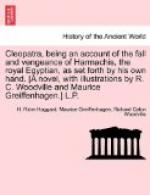She ceased, and having naught to say, I bowed my head in answer. Yet though I said nothing and though this woman’s passionate folly had been the cause of all our ruin, to speak truth, in secret I was thankful to her who, wooed of all and living in this shameless Court, had still through the long years poured out her unreturned love upon an outcast, and who, when that poor broken slave of Fortune came back in such unlovely guise, held him yet dear at heart. For what man is there who does not prize that gift most rare and beautiful, that one perfect thing which no gold can buy—a woman’s unfeigned love?
“I thank thee that thou dost not answer,” she said; “for the bitter words which thou didst pour upon me in those days that long are dead, and far away in Tarsus, have not lost their poisonous sting, and in my heart is no more place for the arrows of thy scorn, new venomed through thy solitary years. So let it be. Behold! I put it from me, that wild passion of my soul,” and she looked up and stretched out her hands as though to press some unseen presence back, “I put it from me—though forget it I may not! There, ’tis done, Harmachis; no more shall my love trouble thee. Enough for me that once more my eyes behold thee, before sleep seals thee from their sight. Dost remember how, when I would have died by thy dear hand, thou wouldst not slay, but didst bid me live to pluck the bitter fruit of crime, and be accursed by visions of the evil I had wrought and memories of thee whom I have ruined?”
“Ay, Charmion, I remember well.”
“Surely the cup of punishment has been filled. Oh! couldst thou see into the record of my heart, and read in it the suffering that I have borne—borne with a smiling face—thy justice would be satisfied indeed!”
“And yet, if report be true, Charmion, thou art the first of all the Court, and therein the most powerful and beloved. Does not Octavianus give it out that he makes war, not on Antony, nor even on his mistress, Cleopatra, but on Charmion and Iras?”
“Yes, Harmachis, and think that it has been to me thus, because of my oath to thee, to be forced to eat the bread and do the tasks of one whom so bitterly I hate!—one who robbed me of thee, and who, through the workings of my jealousy, brought me to be that which I am, brought thee to shame, and all Egypt to its ruin! Can jewels and riches and the flattery of princes and nobles bring happiness to such a one as I, who am more wretched than the meanest scullion wench? Oh, I have often wept till I was blind; and then, when the hour came, I must arise and tire me, and, with a smile, go do the bidding of the Queen and that heavy Antony. May the Gods grant me to see them dead—ay, the twain of them!—then myself I shall be content to die! Thy lot has been hard, Harmachis; but at least thou have been free, and many is the time that I have envied thee the quiet of thy haunted cave.”
“I do perceive, O Charmion, that thou art mindful of thy oaths; and it is well, for the hour of vengeance is at hand.”




